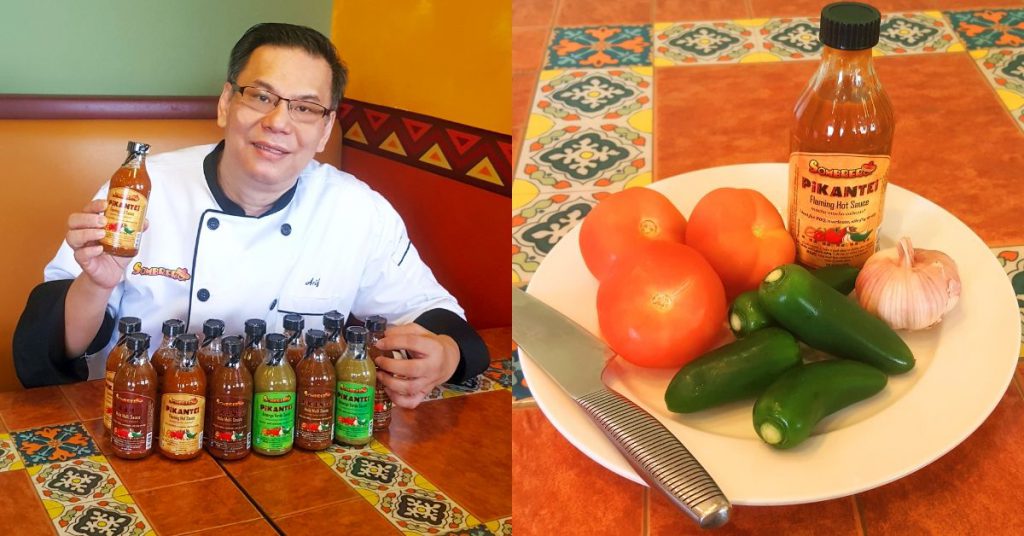When you spend 20 years in the US and go on numerous trips to Mexico, you’d be hard pressed to avoid the tantalising appeal of spicy and vibrant Mexican cocina (cuisine).
At least, that’s what happened to Chef Arif “Gonzales”. He’s a Malaysian Chinese-Muslim skilled in cooking Mexican food, and he got his nickname from his Latino friends back in the States.
“With an acute sense in food tasting and an instinctive knack for cooking, learning Mexican cooking has always been a delight by playing with various exotic ingredients and colours,” Chef Arif told Vulcan Post.
Once he returned to Malaysia, he was given a good RM1,000 rental offer in Bangsar to open a café of his liking in 2012.
He and his wife decided to try their hand at Mexican, and that was how they started their brand Sombrero that serves a wide range of Tex-Mex and authentic Mexican cocina.

4 years ago, they began making and serving natural Mexican hot sauces at Sombrero, which their customers loved pairing with tacos, fajita or grilled foods.
These authentic sauces weren’t easy to access in ASEAN, as Chef Arif said that no one was making them for retail here.
So in 2018, when several customers gave them the idea of bottling the sauces, Nando’s-style, Pikantei (taken from the word picante, which means ‘spicy’) was born.
Different From The Others
“We started doing R&D to figure out how best to bottle all-natural hot sauces without using preservatives and sophisticated multimillion dollar production machines,” Chef Arif said.
Now, they’ve finally figured it out, and Pikantei hot sauces have a shelf life of about 1 year unopened.
As demand increased, they’ve moved production into a central kitchen where the sauces are made in micro batches.
“We believe the demand for Mexican hot sauces will be high,” Chef Arif said when we asked him about sales so far.
“It’s just that Mexican cocina is rather new in ASEAN. It does take time to create the awareness, like ‘oh wow, there are other exotic hot sauces we haven’t tried before’. After all, who in ASEAN doesn’t like spicy sauces?” he reasoned.

As someone who’s never had any other hot sauce besides Sriracha, Tabasco and Nando’s PERi-PERi Sauce, I wanted to know how Mexican hot sauce would be different.
“Mexican hot sauces have that distinctive smoky, rustic, earthy taste notes, or a refreshing tangy flavour,” Chef Arif described.
“Because Mexico was once occupied by the Spanish, who brought to them some of the Mediterranean and Arabic food culture, that gave rise to an exotic fusion of taste that Mexicans and offering today.”
Supposedly, Pikantei’s sauces are also healthier as tomato is a primary ingredient in addition to other things like garlic and onion.
They can be used for marinating meat, in veggie stir-fries, or even simply for dipping nacho chips or French fries.
As Authentic As Can Be
Pikantei currently has 3 sauces to its name, and they are Flaming Hot (roja), Amargo Verde (green refreshing, as Chef Arif put it), and Mole Molli (traditional Oaxacan sauce with cocoa and tree nuts).
One thing they all have in common are these 3 adjectives: authentic, vegan, and halal.
According to Chef Arif, the sauces are made both with some of the exact ingredients from Mexico and the US, and with similar ingredients that are native to Malaysia.

“Our Mole requires close to 2 dozen ingredients, whereas the Oaxacan Mole could use up to 3 dozen ingredients,” Chef Arif compared.
So yes, these sauces aren’t 100% the way a traditional Mexican mama would cook them, but they’re rather close.
All these ingredients are also plant and mineral based, which makes the sauces vegan. This suits the increasing number of health-conscious people just fine, and Mesoamerica prior to the Spanish occupation had a primarily vegetarian diet anyway.
As for the halal part of the sauces, Sombrero is a 100% Muslim owned and operated F&B business, though they are still in the midst of applying for JAKIM cerification.
However, because many Malaysians in Klang Valley already know of Sombrero, “the trust is already there”, as Chef Arif put it.
Spicing Things Up
But that doesn’t mean that the business came without challenges.
Firstly, attempting to R&D an all-natural (no highly processed ingredients, preservatives, colouring, stabiliser or conditioners) hot sauce to have a shelf-life of 1 year wasn’t easy.
“Many previously told us we were nut cases to do it,” Chef Arif recalled, and added, “We did it and lab tested it anyway.”
The next challenge is now to convince the general public to buy a bottle of Pikantei sauce, as one can retail for about RM15 to RM18 in various stores like Jaya Grocer, Hock Choon, Ampang Grocer, AzZainMart, and on platforms like foodpanda and GrabFood too.

“Thus, we had to focus on the upper middle income demography in the beginning,” Chef Arif said.
It would appear that Pikantei is slowly picking up momentum, however, since he said that their booth at MIHAS expo in April this year garnered a good response.
Right now, they’re already doing R&D on another Mexican hot sauce, this time one with pineapple and mango for a tropical taste.
In line with their plans of raising awareness about the availability of their authentic, halal and vegan hot sauces, Sombrero has been reaching out to various advertising media.
They also recently posted some short videos on their Facebook to teach foodies how to cook simple Mexican cocina with Pikantei hot sauces, which they hope will help locals add a little spice to their lives.
- You can read more about other Malaysian startups we’ve written on here.
Featured Image Credit: Pikantei













